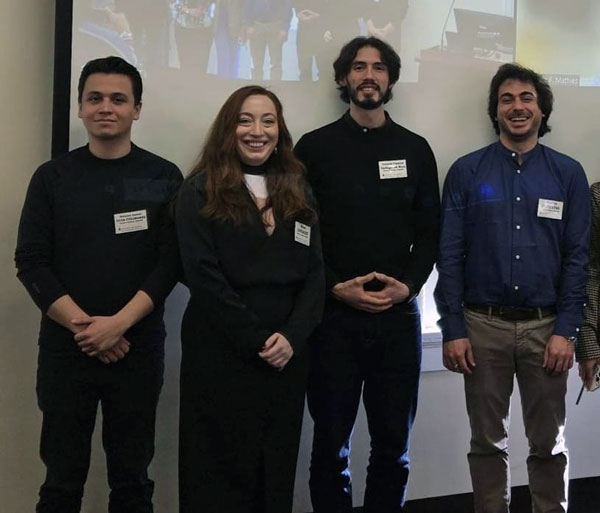Top Priorities for New Professionals in the Field of Institutional Research Today
 As part of an international master’s program in Research and Innovation in Higher Ed.,
we had the opportunity to explore the most salient aspects of institutional research (IR) from valuable professionals in the field. This short article summarizes the reflections derived from the course and the experience on the field at the University
of Georgia’s Louise McBee Institute of Higher Education in Athens, GA.
As part of an international master’s program in Research and Innovation in Higher Ed.,
we had the opportunity to explore the most salient aspects of institutional research (IR) from valuable professionals in the field. This short article summarizes the reflections derived from the course and the experience on the field at the University
of Georgia’s Louise McBee Institute of Higher Education in Athens, GA.
The proliferation of data and analytics in higher education has ushered in a new transformative era filled with both possibilities and complexities. As higher education institutions (HEIs) are confronted with the opportunities and challenges presented by vast amounts of data and emerging AI analytics, the role of institutional research (IR) becomes increasingly crucial. In this piece, we explore the top priorities for new professionals entering the field of IR amid this transformative era, drawing from three main sources: IR classics including Terenzini’s Tiers of Intelligence (1993, 2013) and Volkwein’s Golden Triangle (2008); discussions with IR professionals with experience in the European and US contexts; and our own perspectives as aspiring IR professionals.
The Importance of the Context
In addition to holding knowledge of fundamental technology and analytics as well as an understanding for the higher education institution, Terenzini proffered that an IR professional should develop a “contextual intelligence” (1993), meaning that one holds the knowledge about the institution, as well as higher education broadly that includes national and international context. The priority of IR professionals should be to intertwine their functions with the universities’ daily processes, becoming the “organizational intelligence” (Fincher, 1978). A deeper understanding of the context is pivotal for several reasons.
IR professionals inform strategic planning initiatives within the university. Understanding the broader context provides valuable insights into demographic trends, educational policies, funding landscapes, and other factors that can influence the university's strategic direction. Knowledge of the context allows IR professionals to benchmark the university's performance against peer institutions, industry standards, and national or international benchmarks. Resource allocation decisions within the university such as budget allocations, staffing decisions, and infrastructure investments are directly linked with strategic planning. Knowledge of the context brought by IR offices informs these decisions and ensures that resources are allocated strategically to support the university's mission and goals.
Furthermore, universities must adhere to various accreditation standards and regulatory requirements at national, regional, and international levels. Institutional researchers need to stay abreast of these standards and ensure that the university remains compliant. Understanding the broader context helps identify areas where the university may need to improve to meet accreditation criteria. Moreover, the reputation and ranking of a university can have significant implications for its ability to attract students, faculty, funding, and partnerships. What’s more, universities often engage in policy development and advocacy initiatives at various levels and institutional researchers contribute to these efforts by providing data-informed insights and analyses that inform policy recommendations and advocacy strategies. Understanding the broader context is essential for identifying policy priorities, anticipating potential impacts, and advocating effectively on behalf of the university.
Research-Related Competencies
New professionals in the field of IR, often fresh out of graduate school, are typically assigned technical and analytical roles that involve data collection, analysis, and visualization responsibilities. Therefore, it is crucial for all IR professionals to have a strong theoretical background in research methodology and proficiency in both quantitative and qualitative research methods and analysis. Additionally, adeptness in using software tools for data analysis and visualization is essential, necessitating continuous learning to keep pace with rapid technological developments.
Furthermore, it's important to recognize that collecting vast amounts of data does not necessarily lead to meaningful insights or better decisions. As William Bruce Cameron
Artificial Intelligence and IR
While AI holds the potential to supplant Terenzini's first tier by automating certain analytical processes, it lacks the contextualized knowledge and human judgment necessary for effective strategic planning within HEIs
Data Security, Privacy, and Ethics
The rapid changes in the ways data are collected, analyzed, reported, and eventually used for supporting decision-making calls for extra attention to three key areas: data security, data privacy, and an ethical approach to the work. These areas simply cannot be overlooked, and their importance can hardly be overstated.
Data security measures are crucial to safeguard sensitive information, such as student records and research data, from unauthorized access and cyber threats. Compliance with regulations such as FERPA and HIPAA (in the U.S. context) and GDPR in Europe is essential to protect the privacy of individuals' data and avoid legal repercussions. Simultaneously, data privacy considerations involve respecting individuals' privacy rights, obtaining consent for data collection, and implementing ethical data handling practices, which includes a careful approach to the use of AI platforms to analyze data. In this whole context, ethical conduct is fundamental to maintaining the integrity and trustworthiness of IR. Professional staff in IR (and other units) must adhere to ethical principles, including honesty, objectivity, and impartiality in research and decision-making processes. Avoiding bias and discrimination is crucial, ensuring that data-informed initiatives promote diversity, equity, and inclusion.
Lastly, the aspect that brings it all together is the capacity to “see the bigger picture,” which can be closely tied to the contextual intelligence referenced by Terenzini
Soft Skills
Another aspect that new IR professionals should not underestimate is the significance of soft skills for streamlining processes as they complement technical expertise and contribute to the overall effectiveness and impact of IR endeavors. Some of these soft skills include critical thinking, communication, and teamwork. Critical thinking, for instance, enables institutional researchers to evaluate the validity of data sources and data collection methods, as well as analyze findings in an objective manner while challenging established assumptions. IR professionals who think critically, therefore, contribute to better informing decision-making processes and avoid incurring unnecessary costs.
The ability to communicate effectively represents an essential soft skill to be considered when deciding on entering the IR field. IR professionals must be able to communicate complex information clearly and concisely to foster understanding and facilitate collaboration with administrators, policymakers, and colleagues. Moreover, IR practitioners convert data into meaningful information by contextualizing it and understanding its intended purpose, recognizing that this knowledge encompasses framed experience, values, and expert insight, serving as a framework for evaluating and integrating new experiences and information (Nel, 2016). When communication is clear, it ensures the proper interpretation and utilization of research insights to nurture the decision-making process.
Given the interdisciplinary and collaborative nature of IR activities, it is necessary to work closely with other units within the institution to collect data promptly and effectively. New professionals in the field of IR must be aware of the importance of teamwork when working within an organization, especially when considering that IR practitioners work across multiple functional units and undertake various roles within the university, such as admissions, marketing, quality assurance, assessment, and strategic planning (Webber, 2020).
In conclusion, we can state that IR serves as universities’ sophisticated compass to navigate transformative times. It is complex, as it evolves alongside different aspects: context, research, technology, ethics, and soft skills. Nonetheless, it provides university leaders with the “human touch,” enabling them to navigate periods of significant change with a deeper understanding. As data analytics becomes increasingly prominent, IR professionals, equipped with this comprehensive toolkit, stand poised to shape the future of higher education through data-driven insights and informed decision-making.
References
Cameron, W. B., (1963). Informal sociology: a casual introduction to sociological thinking. Random House.
Fincher, C. (1978). Institutional research as organizational intelligence. Research in Higher Education, 8(2), 189–192. https://doi.org/10.1007/BF00992119
Nel, H. (2016). The Role of Institutional Research in Support of Strategic Planning. In J. Botha & N. Muller (Eds.), Institutional Research in South African Higher Education - Intersecting Contexts and Practices (pp. 99–116). SUN PRESS. https://doi.org/10.18820/9781928357186/06
Terenzini, P. T. (1993). On the Nature of Institutional Research and the Knowledge and Skills It Requires. Research in Higher Education, 34(1), 1–10. https://doi.org/https://doi.org/10.1007/BF00991859
Terenzini, P. T. (2013). “On the Nature of Institutional Research” Revisited: Plus ça Change...? Research in Higher Education, 54(2), 137–148. https://doi.org/10.1007/s11162-012-9274-3
Volkwein, J. F. (2008). The foundations and evolution of institutional research. New Directions for Higher Education, 2008(141), 5–20. https://doi.org/10.1002/he.289
Webber, K. L., & Zheng, H. Y. (2019). Data Analytics and the Imperatives for Data-Informed Decision Making in Higher Education. IHE Research in Progress Series, 4. https://ihe.uga.edu/sites/default/files/inline-files/Webber_2019004_paper.pdf
Webber, K.L. “Building Capacity in IR and Decision Support: Alliances for Higher Education Research (HER) and Institutional Research (IR)” (2020). IHE Research Projects Series 2020-001. Available at: https://ihe.uga.edu/rps/2020_001

From left to right: Heisler Sosa, Nino Gogadze, Hesam Sadeghian Rios, Mattia Quinteri; Department for Higher Education Research, Universität für Weiterbildung Krems, Austria
